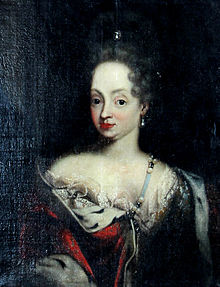Louise of Mecklenburg-Güstrow
| Louise of Mecklenburg-Güstrow | |
|---|---|

Portrait by Jacob d'Agar, c. 1700
|
|
| Queen consort of Denmark and Norway | |
| Reign | 25 August 1699 - 15 March 1721 |
| Born |
28 August 1667 Güstrow |
| Died | 15 March 1721 (aged 53) Copenhagen |
| Burial | Roskilde Cathedral |
| Spouse | Frederick IV of Denmark |
| Issue |
Christian VI of Denmark Princess Charlotte Amalie |
| House | Mecklenburg |
| Father | Gustav Adolph, Duke of Mecklenburg-Güstrow |
| Mother | Magdalene Sibylle of Holstein-Gottorp |
| Religion | Lutheran |
Louise of Mecklenburg-Güstrow (28 August 1667 – 15 March 1721) was Queen consort of Denmark and Norway as the first spouse of the King Frederick IV of Denmark.
She was born in Güstrow in the family of Duke Gustav Adolph of Mecklenburg-Güstrow and Magdalene Sibylle of Holstein-Gottorp as a great-great-granddaughter of Frederick II of Denmark. Her maternal grandparents were Duke Frederick III of Holstein-Gottorp and Marie Elisabeth of Saxony. Louise grew up into a tiny court characterized by pietistic feelings and rigid religiosity led by her father who wrote religious songs in pietistic spirit. When Louise was chosen as consort to the Danish-heir it received wholehearted acceptance from the royal house, while the Crown Prince himself, despite the promise of greater choice, in fact, had no other choice than the Duke's daughters, Louise was the one chosen by Frederick as he expected her to accept his affairs without protests.
On 5 December 1695, Louise married Crown Prince Frederik at Copenhagen Castle and became Queen consort of Denmark in 1699. Their only children who reached maturity were King Christian VI of Denmark and Princess Charlotte Amalie of Denmark.
Louise lived quietly at the Danish Court. Unlike Frederick IV she never gained popularity with the population. Louise figured in her role as queen at official ceremonies, but was otherwise ignored at court, and her isolated and quiet life has made her less known in history. Her passive attitude did not gain her any respect from the royal house. It is mentioned that she caused embarrassing scenes at court during Frederick's affairs and that she had a bad temperament.
...
Wikipedia
